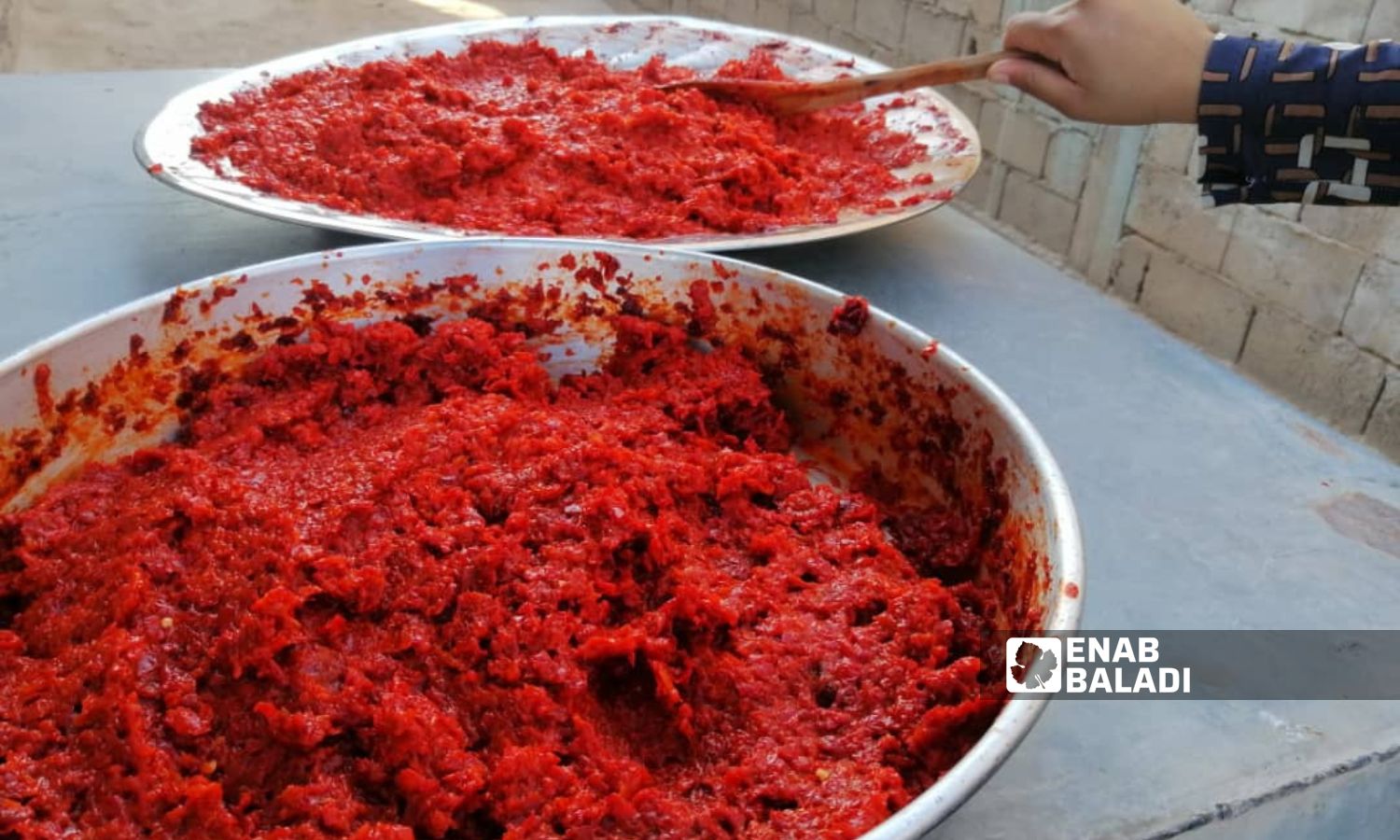



Deir Ezzor – Obadah al-Sheikh
For the first time in 35 years, food staples are absent from the home of 50-year-old Samar al-Ahmad, residing in the town of Granij in eastern Deir Ezzor countryside. In the past, the months of August and September were filled with storing eggplants, molokhia, okra, kishk, zucchini, and jams in preparation for winter.
The displaced woman from Deir Ezzor city to its countryside can barely secure her family’s daily meal and basic needs. Her three sons’ day jobs as porters do not provide a stable income to prepare the food stores, earning each of them 35,000 Syrian pounds per day from irregular work.
She told Enab Baladi that her sons bring home vegetables from the al-Hal market, which helps cover expenses and the house rent of 400,000 Syrian pounds.
Many residents in Deir Ezzor share the same conditions, whether it’s a complete absence of food storage or a significant reduction in quantities due to worsening economic and living conditions and fewer job opportunities.
Deir Ezzor is divided into two parts: the eastern part controlled by the Autonomous Administration of North and East Syria (AANES) and its military arm, the Syrian Democratic Forces (SDF), and the western part under the control of the Syrian regime.
With sorrow, 45-year-old Hiyam al-Tabash, residing in the village of al-Tayba, recalls the atmosphere of preparing mouneh in past years. She used to start with the girls of the family at the beginning of August each year to prepare vegetables and jams.
The woman, who works as a teacher, said her monthly salary no longer covers expenses for more than two or three days, making her refrain from storing food, just like many other families, according to her.
She mentioned that she couldn’t even dry eggplants as before, despite their low price at the beginning of their season.
Meanwhile, 23-year-old Marwa al-Jamal, who works with the Deir Ezzor Civil Council, said that the high cost of food storage forced her family to store half the usual quantity.
She added that her family used to prepare and dry 200 kilograms of molokhia, 100 kilograms of eggplants, 25 kilograms of kishk, 35 kilograms of okra, and about 100 kilograms of makdous. But this year, all quantities have been nearly halved.
In addition to the deteriorating economic conditions, the high prices of summer vegetables during their season affected their preparation as mouneh, especially after the military escalation that Deir Ezzor countryside witnessed last August.
Shihab al-Khalaf, a trader in the al-Hal market in the town of Theban in eastern Deir Ezzor countryside, told Enab Baladi that the high prices of vegetables prevented many from buying and storing them. He added that the high prices of materials used in stored food, like makdous eggplants, made many abandon its preparation.
He stated that the price of a kilogram of eggplants reached 7,000 Syrian pounds, red peppers 6,500 pounds, one liter of olive oil 120,000 pounds, and one kilogram of walnuts 150,000 pounds, all of which are used in preparing makdous.
The trader mentioned that the decline in wage levels led many families to abandon food storage and only buy daily necessities, adding that peas and beans have been absent for years because they require electricity.
Residents of the region live in deteriorating living conditions, similar to other areas of conflict across Syria. However, the regions controlled by the Autonomous Administration are the wealthiest in Syria, containing most oil wells and being described as Syria’s food basket due to agricultural activity.
The suffering is compounded by the local currency’s decline. In Autonomous Administration areas, an employee’s salary does not exceed 1 million Syrian pounds ($65), while the minimum salary in regime-controlled areas is 279,000 Syrian pounds ($18).
if you think the article contain wrong information or you have additional details Send Correction